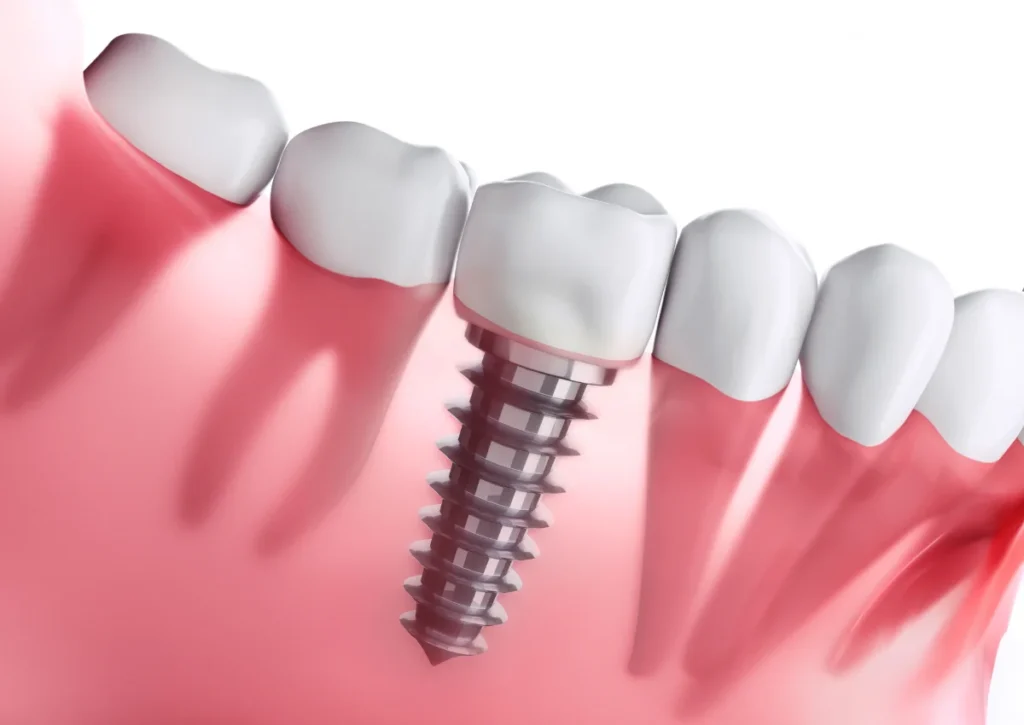Our Services
Dental Implants

What are Dental Implants?
Dental implants are like artificial tooth roots, used to replace missing teeth. They are surgically placed into the jawbone, providing a strong foundation for replacement teeth. Implants can be used to replace a single tooth, several teeth, or even all of the teeth in a jaw. They look and feel like natural teeth and can improve your smile, speech, and chewing ability.
The implant process typically involves several steps, including a thorough evaluation, implant placement, and placement of the replacement teeth. With proper care, dental implants can last a lifetime, making them a durable and long-term solution for tooth replacement. If you're missing teeth and looking for a permanent and natural-looking solution, dental implants could be the answer for you.
Types Of Dental Implants
1) Endosteal Implants: This is the most common type of dental implant, where a titanium post is surgically placed into the jawbone to serve as a sturdy anchor for the replacement tooth or teeth. Endosteal implants are suitable for patients with sufficient jawbone density.
2) Subperiosteal Implants: Subperiosteal implants are placed on or above the jawbone but beneath the gum tissue. They consist of a metal framework that protrudes through the gums to hold the artificial teeth securely in place. This type of implant is often recommended for patients who do not have enough healthy jawbone to support traditional implants.
3) All-on-4 Implants:
All-on-4 implants are a specialized type of dental implant technique used to replace an entire arch of missing teeth (either upper or lower) with just four implants. This method utilizes strategically placed implants and angled abutments to maximize support and stability for a full set of artificial teeth.
4) Zygomatic Implants: Zygomatic implants are longer than traditional implants and are anchored into the cheekbone (zygomatic bone) rather than the jawbone. They are used in patients who have severe bone loss in the upper jaw and may not be candidates for traditional implants.
5) Mini Implants: Mini implants are smaller in diameter than standard implants and are often used in cases where there is limited space or bone density. They are less invasive and can be placed in a single appointment, making them a convenient option for stabilizing dentures or replacing small teeth.
Dental Implants Procedure
The dental implant procedure typically involves several stages:
1) Initial Consultation: The process begins with a comprehensive examination and consultation where the assessment of the patient's oral health, reviewing medical history, and discussion of treatment options. are done
2) Treatment Planning: Based on the evaluation, a personalized treatment plan is created. This includes determining the number of implants needed, the type of restoration (crown, bridge, or denture), and the overall timeline.
3) Surgical Placement of Implant: In the surgical phase, a titanium implant is precisely placed into the jawbone at the site of the missing tooth. This serves as the artificial root for the future restoration.
4) Osseointegration: Over several weeks to months, the implant fuses with the jawbone through a process called osseointegration, providing a stable foundation for the prosthetic tooth.
5) Abutment Placement: Once osseointegration is complete, a small connector called an abutment is attached to the implant. This extends above the gum line and serves as the anchor for the final restoration.
6) Impressions and Fabrication: Impressions of the abutment and surrounding teeth are taken to create a custom-made crown, bridge, or denture that will be securely attached to the abutment.
7) Final Restoration Placement: The final restoration is carefully placed onto the abutment and adjusted for fit and bite. The result is a functional and aesthetically pleasing replacement tooth.
8) Follow-Up and Maintenance: Regular follow-up appointments are scheduled to monitor healing, assess the implant's stability, and ensure proper oral hygiene. Patients are advised on maintenance practices for long-term success
Benefits Of Dental Implants
Below are some benefits of a dental implants:
- Natural Appearance: Dental implants closely mimic the look and feel of natural teeth, providing a seamless and aesthetically pleasing smile.
- Improved Chewing Function: With the stability and strength of dental implants, patients can enjoy a varied diet without restrictions, restoring full chewing ability.
- Long-Term Durability: Dental implants are a permanent solution to tooth loss and, with proper care, can last a lifetime, offering a cost-effective option in the long run.
- Preservation of Jawbone Health: By stimulating the jawbone through chewing forces, dental implants help prevent bone loss and maintain facial structure and integrity.
- Enhanced Confidence: Dental implants restore the ability to speak, smile, and eat with confidence, improving overall quality of life and self-esteem for individuals with missing teeth.
Frequently Asked Questions
While dental implants are a popular tooth replacement option, not everyone may be a candidate. Factors such as overall health, jawbone density, and gum health will be evaluated by your dentist to determine suitability.
The dental implant procedure is typically performed under local anesthesia, ensuring that patients feel little to no discomfort during the surgery. Some soreness or discomfort may be experienced during the recovery period, but it is usually manageable with pain medication prescribed by the dentist.
The timeline for dental implant treatment varies depending on individual factors such as the number of implants needed, the need for additional procedures like bone grafting, and the healing process. On average, the entire process can take several months to complete from implant placement to final restoration.
Dental implants are designed to be a permanent solution for tooth loss, as they are securely anchored into the jawbone. With proper care and maintenance, including regular dental check-ups and good oral hygiene practices, dental implants can last a lifetime.
Book An Appointment
Please feel free to contact us if you have any questions about our services or to schedule an appointment.